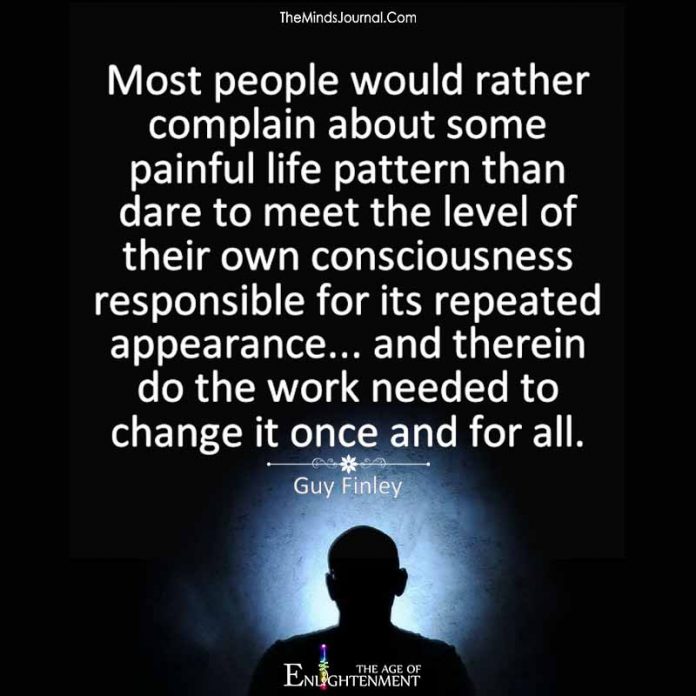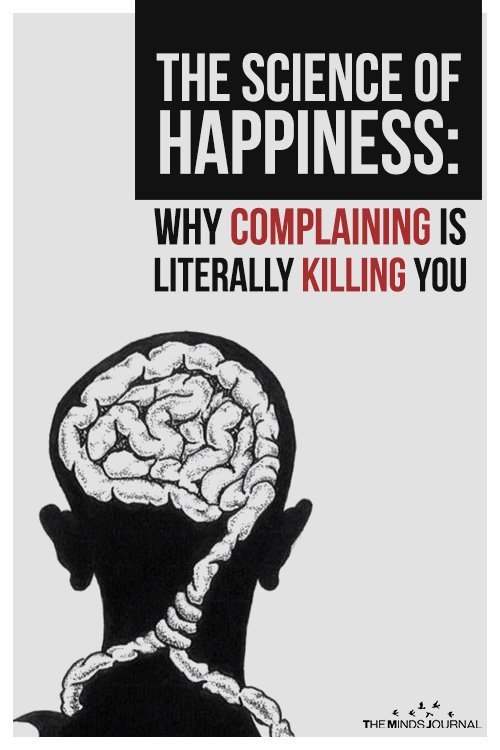Complaining can kill your happiness. According to the science of happiness, complaining excessively can inhibit our ability to be positive and stunt our capacity to experience joy and happiness in life.
What is the science of happiness?
The science of happiness refers to the study of what exactly makes us happy and enables us to flourish. Positive psychology, a novel field of social science is widely considered as happiness science as it allows us to change our lives in a positive way. However, positive psychology is not limited to positive thinking or applying self-help tools in your life. It consists of a wide field of research and application. According to a 2014 study {1}, positive psychology refers to the study of a flourishing and healthy life. “The goal of positive psychology is to complement and extend the traditional problem-focused psychology that has proliferated in recent decades,” adds the study. This field is related to positive psychological traits (interests, skills, talents & character), positive psychological traits (interests, skills, talents & character), and positive relationships.
The science of happiness aims to understand what makes humans flourish. Positive psychology is not ignorant of mental illness or human suffering. Instead, it focuses on encouraging communities and individuals to implement practices that can enhance our optimism, boost our resilience, and empower us to live meaningful and happy lives. This form of psychology effectively operates in enabling individuals to gain what they seek, practice self-development, and become happier in life. However, complaining frequently can effectively kill our happiness by bringing negativity into our lives unnecessarily.
Read also: 15 Prescriptions for Happiness That Will Change Your Life
Complaining can be toxic

When we complain regularly, it adversely affects our psychological state and influences our mood, emotions, and even our productivity. Every time we introduce negative emotions into a discussion without offering any resolution, we are complaining. It can not only affect our mood and behavior, it can also adversely affect our productivity as well. Moreover, frequent negativity can also create distress in our relationships and career. But that’s not all. It can be toxic for your health and brain as well.
Complaining rewires the brain
It has been observed that negativity and complaining can alter our brains and drastically affect our mental health. Complaining regularly can actually kill you. Our brain involves a set of synapses surrounded by empty spaces known as the synaptic cleft. {2} Everytime thought arises, a chemical is transmitted from one synapse to the other over the cleft. This creates a bridge to transfer electrical signals along with necessary information about the thought. This process is extremely similar to how nerves carry electrical charges from our toe to our brain where we actually feel the sensation. When these electrical signals are triggered, the synapses become closer to reduce the distance for transferring the electrical charge. This is how our brain rewires itself and its circuitry by physically modifying itself to make the process easier for the right synapses to share the chemical link and spark combinedly. This enables our thoughts to trigger more easily. Hence, there is no doubt that our brain is physically reshaped by our thoughts.
Read also: The 3 Types of Complainers You Should Stay Away From
But that’s not all. Engaging in negative thoughts repeatedly can make us develop a negative mindset without us even realizing it. {3} When we constantly complain about our lives, it soon becomes a habit. As a result, the closer synapses drive us to have a more pessimistic outlook towards life, making us engage in complaining even more. By repeatedly engaging in negative thinking and complaining about your life over time, the synapses which present your tendencies are brought closer. Eventually, when you try to develop a thought, you build a negative one due to your habit as it requires the electrical charges to cover less distance between synapses. Soon, negativity overcomes positivity, affecting your mind, body and soul.
Read also: Chronic Negativity: How it Poisons Your Mind, Body, and Soul
How complaining can kill you

According to a Stanford study,{4} engaging in complaining or even listening to it for over 30 minutes can lead to physical damage of the neurons in our hippocampus,{5} which is responsible for cognitive function and problem-solving. Moreover, it also affects our physical wellbeing and triggers cortisol, the stress hormone. Cortisol helps with memory formulation, regulation of metabolism, and inflammation and controls blood sugar levels. When you complain regularly, you reduce your capability to process information.
High levels of cortisol make us increasingly stress-reactive. Stress reactivity makes us reactive to threats. It means that we are less tolerant of threats and even the slightest threat, which may be real or perceived, can trigger a strong stress response. “Brief everyday stressors can provoke cardiovascular, hormonal, and immune changes,” states a 2020 study. {6}
Stress response can make us dumber as anticipating action emphasizes blood flow into the muscles and away from the neocortex, a part of our brain’s cerebral cortex. Stress reactivity also reduces our compassion & empathy and increases egocentrism by triggering our self-preservation instincts. In fact, stress response and enhanced cortisol can result in a weakened immune system and boost the risk for diseases, cholesterol, blood pressure as well as weight gain. According to the science of happiness, complaining can actually kill you.
Read also: 10 Ways To Deal With Toxic People Who Spread Negativity
Change your perspective
We cannot anticipate or control life. More often than not, life doesn’t go our way and we find comfort in complaining about all that is wrong in our lives. But by avoiding the temptation to complain, developing a new perspective and implementing positive psychology strategies, we can boost our ability to cope with challenges and experience happiness. Moreover, it can also allow us to live a longer and healthier life.
“To avoid the damage caused by a good rag session, look for other ways to solve the problems that trigger your complaining. By removing the root cause, the complaining will go along with it,” suggests entrepreneur John Rampton.
Read also: 4 Easy Ways To Let Go Of Negativity From Your Life And Find Happiness
References: 1. https://www.ncbi.nlm.nih.gov/pmc/articles/PMC6124958/ 2. https://www.ncbi.nlm.nih.gov/pmc/articles/PMC1323199/ 3. https://www.ncbi.nlm.nih.gov/pmc/articles/PMC2899011/ 4. https://news.stanford.edu/pr/96/960814shrnkgbrain.html 5. https://www.ncbi.nlm.nih.gov/pmc/articles/PMC60045/ 6. https://www.ncbi.nlm.nih.gov/pmc/articles/PMC7983854/










Leave a Reply
You must be logged in to post a comment.